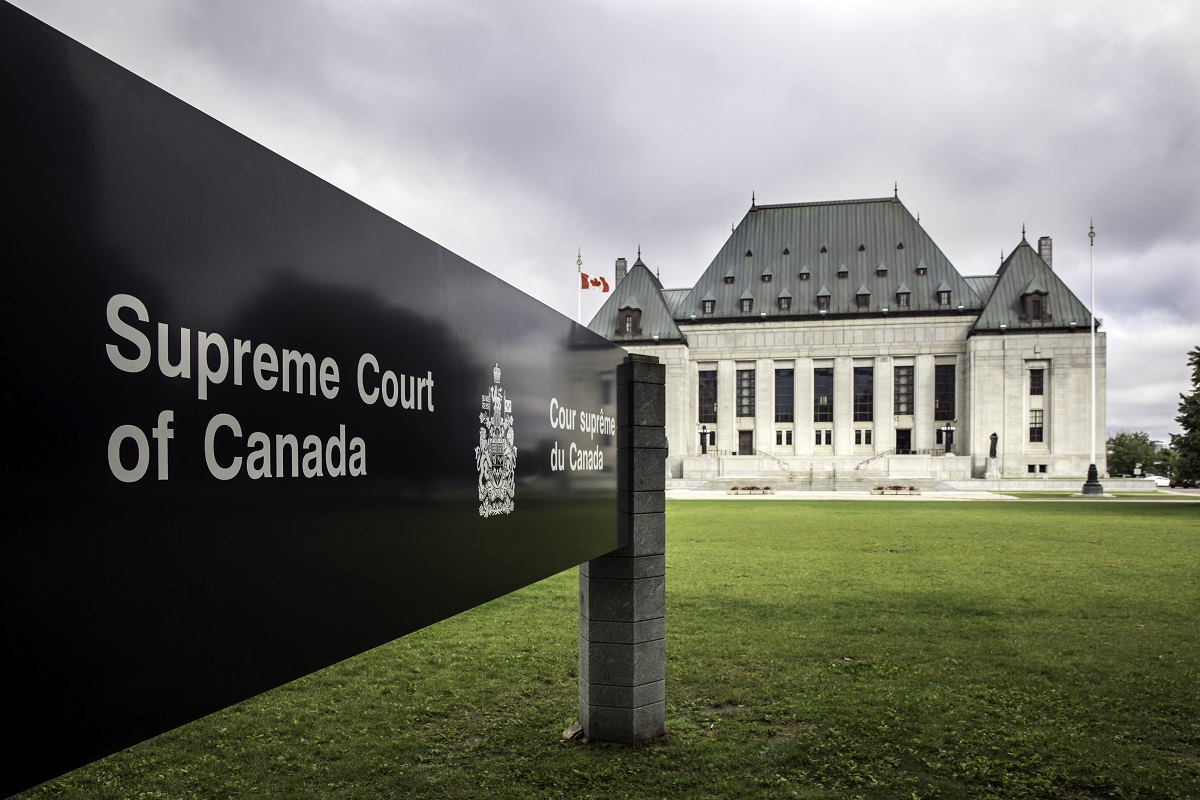Canada’s top judge has assumed the presidency of an international organization dedicated to strengthening the rule of law and promoting judicial independence in French-speaking constitutional courts around the globe.
On May 1 in Montreal, Chief Justice of Canada Richard Wagner opened a two-day conference of the Association des Cours Constitutionnelles ayant en Partage l’Usage du Français (ACCPUF) — an organization that was created in 1997 to build and solidify mutually supportive relationships among constitutional courts which operate in nations that use the French language.
Chief Justice Wagner succeeds Ulrich Meyer, first president of the Federal Supreme Court of Switzerland, as the ACCPUF’s president, an unpaid position, for the next three years.
“I am very proud of the fact that the Supreme Court of Canada is able to lend its support to an association like the ACCPUF, whose mission is, in part, to help strengthen the rule of law in French‑speaking countries,” Chief Justice Wagner told Law360™ Canada through a court official.
Supreme Court of Canada Chief Justice Richard Wagner said he is "very proud" his court is lending its support to an organization of constitutional courts whose aim is to strengthen the rule of law in French speaking countries.
 “As an institution, the Supreme Court of Canada is held in high regard both at home and abroad,” the chief justice noted. “I expect that the court’s good reputation will be a positive influence in the pursuit of the association’s important mission.”
“As an institution, the Supreme Court of Canada is held in high regard both at home and abroad,” the chief justice noted. “I expect that the court’s good reputation will be a positive influence in the pursuit of the association’s important mission.”
The ACCPUF — whose general assembly votes May 2 on changing the organization’s name to “Association des cours constitutionnelles francophones” (ACCF) — has members from more than 40 constitutional courts (or equivalent institutions) in Africa, Europe, Asia and America.
The group collaborates closely with the Organisation internationale de la Francophonie (OIF) in efforts to achieve the ACCPUF’s aims of strengthening the rule of law and supporting the authority of constitutional courts, mainly through the exchange of ideas and experiences, and through mutual co-operation and assistance, mostly via training, and technical and material support.
The challenges constitutional courts face across the globe are quite diverse. In some countries, getting access to legal books or other basics is a major hurdle to delivering justice. For others, a key challenge is to earn the public’s confidence that the court is delivering justice in accordance with the rule of law.
As ACCPUF’s president Chief Justice Wagner, whose own court leads the way in Canada in judicial communications with the media and Canadian public, will continue to convey his passionate conviction that the public’s trust in courts depends on public understanding of the justice system, including the importance of an independent judiciary to a free and democratic society. In turn, public understanding depends on courts communicating well with the public.
“International exchanges and co-operation efforts such as those led by the association can be incredibly useful in that regard,” the chief justice remarked.
The theme for the annual conference underway in Montreal is “Constitution and Legal Certainty.” (Past conference themes included Judicial Drafting, the Conduct of Proceedings, Children’s Rights and the Constitution, and Citizens’ Access to Constitutional Justice.)
“The notion of ‘legal certainty’ has not been theorized in the same way in our respective jurisdictions, which do not all address in the same way the problems posed by situations of insecurity, instability, uncertainty and inaccessibility of the law (translation),” Chief Justice Wagner told the ACCPUF’s general assembly in French (a copy of his written text was provided to Law360™ Canada by his office).
“While the concept of legal certainty is sometimes recognized as a legal norm — some argue that it is a universal norm inherent in the rule of law — others (and this is the case of Canada) recognize instead that legal certainty is an essential value that underlies the legal order,” Chief Justice Wagner said. “In my opinion, whether certainty is established as an independent normative principle or as part of the fundamental values recognized by a legal system, it is unquestionably an end of the law. To guarantee social peace, the law must aim at accessibility, stability and predictability.”
During the chief justice’s three years as president, the ACCPUF expects to focus on co-operation between members via: international exchanges; the creation of a bursary program for staff of member institutions; and the provision of support for training within, and between, member institutions.
To guarantee social peace, the law must aim at accessibility, stability and predictability.
A second focus is improving communications, for example, by enhancing ACCPUF’s website; publishing conference materials; and assisting member institutions with training on plain-language communications and media relations.
A third area of focus will be providing member courts with such technical and material support as legal materials and books and language training.
As well ACCPUF will continue to co-operate with the Organisation internationale de la Francophonie and the Venice Commission of the Council of Europe, in exchanges of information and networking, including by members contributing to the CODICES international database on constitutional jurisprudence.
 The ACCPUF has also committed to supporting the implementation of the Declaration of Bamako, adopted on Nov. 3, 2000, by ministers and delegates of states and governments of francophone countries.
The ACCPUF has also committed to supporting the implementation of the Declaration of Bamako, adopted on Nov. 3, 2000, by ministers and delegates of states and governments of francophone countries.
The declaration is a reference document for the OIF in the areas of democracy and human rights and provides an action plan to help strengthen the rule of law in French-speaking countries.
The ACCPUF is expecting to boost its efforts to collaborate with the OIF, notably in the area of ensuring fair and democratic elections. For example, on Oct. 31 and Nov. 1, 2018, the ACCPUF and the OIF organized in Rabat, Morocco a joint seminar on managing electoral disputes, of which eight member institutions took part. The seminar addressed such issues as the general principles of electoral law and best practices for communications in the context of electoral disputes.

 In the 1990s, a young Romanian immigrant Elisa Hategan was a prominent figure within neo-Nazi circles in Canada as a member of the racist Heritage Front and with her work with Holocaust denier Ernst Zundel. She was a speaker at rallies, a writer of several articles and she has also appeared on television programs like The Montel Williams Show. When things started to take a dark turn with the Heritage Front however, and she began to rethink her own perspectives about who she is and what direction she was going in, she not only left her old group, she provided enough information to anti-racist activists and government agencies to bring the Heritage Front down. Problem is, when you are providing help to a government agency that is working against you, that tends to make things that much worse. Over a decade after she left the hate behind, she has written a book about her life and experiences, Race Traitor: The True Story of Canadian Intelligence Service’s Greatest Cover-Up.
In the 1990s, a young Romanian immigrant Elisa Hategan was a prominent figure within neo-Nazi circles in Canada as a member of the racist Heritage Front and with her work with Holocaust denier Ernst Zundel. She was a speaker at rallies, a writer of several articles and she has also appeared on television programs like The Montel Williams Show. When things started to take a dark turn with the Heritage Front however, and she began to rethink her own perspectives about who she is and what direction she was going in, she not only left her old group, she provided enough information to anti-racist activists and government agencies to bring the Heritage Front down. Problem is, when you are providing help to a government agency that is working against you, that tends to make things that much worse. Over a decade after she left the hate behind, she has written a book about her life and experiences, Race Traitor: The True Story of Canadian Intelligence Service’s Greatest Cover-Up. Q: In recent years we have seen a lot of the older, more established organizations fall apart (National Alliance, Aryan Nations, etc.) due to their elderly leaders passing on and those that are left incapable of maintaining them because of infighting, greed or just flat out incompetence. In your opinion, do you feel it was pretty much inevitable?
Q: In recent years we have seen a lot of the older, more established organizations fall apart (National Alliance, Aryan Nations, etc.) due to their elderly leaders passing on and those that are left incapable of maintaining them because of infighting, greed or just flat out incompetence. In your opinion, do you feel it was pretty much inevitable? “As an institution, the Supreme Court of Canada is held in high regard both at home and abroad,” the chief justice noted. “I expect that the court’s good reputation will be a positive influence in the pursuit of the association’s important mission.”
“As an institution, the Supreme Court of Canada is held in high regard both at home and abroad,” the chief justice noted. “I expect that the court’s good reputation will be a positive influence in the pursuit of the association’s important mission.” The ACCPUF has also committed to supporting the implementation of the Declaration of Bamako, adopted on Nov. 3, 2000, by ministers and delegates of states and governments of francophone countries.
The ACCPUF has also committed to supporting the implementation of the Declaration of Bamako, adopted on Nov. 3, 2000, by ministers and delegates of states and governments of francophone countries.